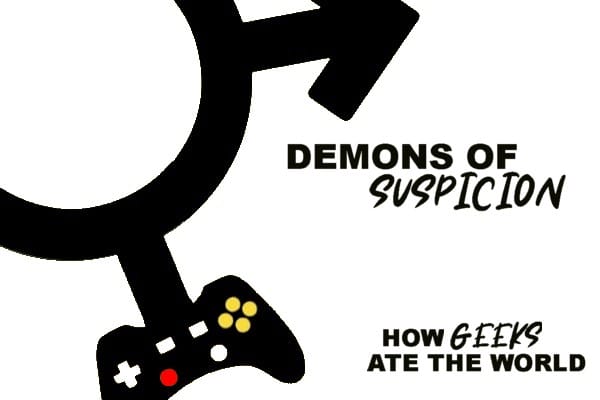🔒 How Geeks Ate the World: Demons of Suspicion
Defining feminism and how its opponents began to organize around a counter-movement ostensibly dedicated to men's rights.

How Geeks Ate the World is the working title of a book that I’m writing, exploring the development of reactionary movements in geek culture (media, tech, and hobbies) since the internet era, and how these movements have come to dominate real world politics in pretty horrifying ways.
I will be publishing chapters and essays related to this project for paying subscribers around once a month. Unlike my regular newsletter, these essays will remain paywalled.
Episode 1 - How Geeks Ate the World
👉Episode 2 - Demons of Suspicion
Episode 3 - Backward Male
Episode 4 - The Californian Ideology
Episode 5 - Something Old, Something New, Something Rotten, Something Awful
Episode 6: The Bomb that Japan Dropped on America
Understanding what is about to unfold politically in geek culture as we enter the 21st Century will require a baseline understanding of what “feminism” is, but asking “what is feminism?” is a mammoth question beyond the scope of this book. It’s an incredibly rich field of modern philosophy and critical theory. There are feminists who bitterly disagree with each other on the details, not just historically, but contemporaneously.
But really there are two different things that are meant by “feminism.” One is academic and one is colloquial. Your average young geek is unlikely to have much contact with academic feminism besides whatever they might have been taught in school, but they would know it colloquially, and adolescent boys in particular are likely to fall somewhere on the scale between apathetic and cringe.
Growing up I was not immune from the allures of the reactionary geek masculinity pipeline. In so far as a teenager can really have a political standing before they know much of anything about politics, I would say that I leaned center-right. This was mainly, I think, because I was a contrarian who thought I was smarter than most people around me. I know exactly what Jon Katz means when he says geeks “can be unnervingly arrogant. Geeks know a lot of things most people don’t know and can do things most people are only beginning to understand.”1
But geeks also often think they know more than they do.
Attempting to earn my qualifications as a secondary school teacher was a hard lesson in what little I actually did know about the world compared to what I thought I knew, and by the time I shifted my studies to a philosophy degree instead I was already softer and more liberal. Hard education from both my professors and my pupils beat a lot of the arrogance out of me.
I don’t recall much of anything that I might have learned in high school about feminism so the version I knew and largely scoffed at was the colloquial version—Oprah and girlboss women’s magazines. My mother was a professional and I was exceptionally proud of her. Likewise my grandmother was a tower of strength and moral fortitude. There were no women in my life who I particularly resented. There was something about boys’ culture that still seemed eager to persuade me that I should.
Philosophy studies would bring me in contact with the academic version of feminism for the first time. It was a culture shock that I met with skepticism. I recall a conversation I once had with Bri, a fiery anarchist who I had made unlikely friends with in class.
Bri came from the outback, from a financially successful farming family, and she was no stranger to the culture of the working class conservative. Her origin story, her hard left turn out of a far-right environment, coincided with her queer awakening, coming of age in an all-girls boarding school and finding that she was far more interested in her classmates than the boys they were all sneaking out to see after hours.
I was a city boy living, at the time, in a lower-class Australian neighbourhood out of financial convenience more than necessity. I had recently been waiting outside the local fish and chips shop for my two-dollar chips, cod, kabana, and potato scallop when I saw a couple of men yelling the most atrocious shit at a random young woman who was walking past on the street. She appeared well practiced in ignoring it.
I told Bri the next day that I was feeling disenchanted with feminist theory at the level we were engaging with it because it didn’t seem like we were achieving anything outside of the walls of academia. Here we were talking about feminism in its third wave (maybe even entering its fourth!) while outside, not thirty minutes travel away, among the real people, I was still witnessing mundane and normalized acts of not just misogyny but downright chauvinism.
Bri reassured me that progress, in the bigger picture, was still being made—it was unlikely that these blokes disagreed with tenets of feminism that had awarded women basic rights, and although there is so much work to be done the work is not in vain. The idea that women shouldn’t vote, for example, is now very fringe, which indicates that feminism has very soundly won at least its initial victories.
This book is mainly about those who did not dig themselves out of a reactionary spiral the way that I did and their opposition to feminism is largely fueled by colloquial impressions of it. For our purposed we can afford to limit our scope to understanding it just a little better than its opponents.
I considered pulling a really good meaty quote from either the Stanford Encyclopedia of Philosophy, or its less academic cousin, the Internet Encyclopedia of Philosophy, but neither of them have one broad article on Feminism—the field is just too complex. So I figured I’d consult my bookshelves for a reference book more appropriate for our needs and settled upon The Complete Idiot’s Guide to Philosophy, which defines it thus:
Although there are many disagreements within feminism, virtually all feminists agree on one key point: Women everywhere have been getting a raw deal for centuries.2
Okay so maybe that is too simplistic, so I’ll try something off the cuff: Feminists all generally agree that male and female lives and voices are not treated equally by modern societies and that, in this inequality, the balance of power tends to favour the male. This power imbalance is usually referred to as “patriarchy” and feminists generally agree that it is an undesirable state of affairs.
You can’t really pinpoint the origin of feminism anywhere in particular because women have always had some degree of agency and have spontaneously been recognising that they have, as Idiot’s Guide succinctly puts it, been getting a raw deal for as long as society has been around, and women have always been noticing. But the modern understanding of feminism usually cites its origin around the time of Mary Wollstonecraft (mother of Frankenstein author Mary Shelley) in the mid 1700s. She was great but we’re not going to go into any of that because as far as the modern anti-feminist movement is concerned you’re going to hear a lot about the so-called Three Waves:
Very, very simplified:
- The First Wave was suffrage. Women’s right to own property, get an education, and most importantly, vote. This battle was fought and won in the USA and most of Europe before the Second World War.
- The Second Wave kicked off after the World Wars (during which women needed to step up to the plate and run society because the men were all away shooting each other with guns) and focused more on women’s workplace equality, and also philosophy about sexual intercourse dynamics became more mainstream and less taboo.
- The Third Wave kicked off in the 80s and 90s and this is where the idea of “intersectionality” really took off and started exploring the ways in which feminism overlaps with other identity- based social inequalities.
As with anything in academia and philosophy there’s argument, including about whether dividing feminism into waves is useful or even accurate.3 But to the extent that these three waves exist, there was and still is a degree of friction between them. Each new wave doesn’t necessarily “replace” the previous ones in the sense that their respective adherents evolve their thinking—some of the founding thought leaders of the second wave are still alive, and while some of them, such as Gloria Steinem, have evolved their own views to embrace the views of the third wave,4 others such as Germaine Greer and Phyllis Chesler soundly reject the third wave. (“It’s a stupid wave,” Greer has said bluntly.)5
Major points of disagreement between second and third wavers often centre on the validity of transgender identities and the connection between gender and biological sex,6 and the subject of Islam as it pertains to women’s rights.
Interestingly, there are also those who embrace the label of feminist but identify only with an anachronistic version of it and reject the mainstream scholarship contemporaneous with their own upbringing. For example, contemporary scholars and activists in what’s known as “radical feminism” clash often with more mainstream third wave discourse and take a great deal to most of their theory from the second wave.
I don’t want to give the impression that there’s anything wrong with that, in and of itself. In the social sciences, something no longer being considered the most mainstream theory doesn’t mean it was “proven wrong,” necessarily. I think it’s also important to correct a very common misconception about the word “radical.” In feminism as well as religion, this word has come to colloquially mean something like “extreme” or taken too far, to an unreasonable extent.
Granted, you can’t fight the evolution of language, as much as you might mourn the once-useful and more literal definition of “literal,” or yearn for the pre-Alanis Morissette definition of “ironic.” Nevertheless, “radical” is in this case supposed to mean something closer to “focusing on the root of the issue” or getting down to the fundamentals.7 As mentioned, this misunderstanding persists in relation to both feminism and religion, but you can see how its implications differ from here—fundamentalism, in religion, can mean unwavering, uncompromising, and literal adherence to a holy document many hundreds or thousands of years old and of questionably divine provenance. In feminism, the founding documents are much younger and their authorship much more assuredly human.
But this way of thinking can also mean conservative, and although radical and second wave feminisms still aren’t what you would call “right-wing,” they do hit some of the same beats. Indeed, the classification of ideas as either left-wing or right-wing tends to be anchored to their time period. That’s what the very words “conservative” and “progressive” mean—holding on to old ideas versus progressing beyond them.
The second wave feminist professor Phyllis Chesler says in her book The Death of Feminism:
Back in the day, I was once considered a good person myself. But I often held the minority position among feminists on most issues and was never a true-blue Marxist-Leninist. My kind did not prevail in the academy or in the media. Today what young people and outsiders may think feminism is really about is not the feminism that many of us once fought for.8
The philosopher and retired Clark University professor Christina Hoff Sommers is, I think, the most visible example of a contemporary first wave feminist. This puts her in an interesting position in that, while she is categorically a feminist, she essentially believes that feminism achieved the majority of its goals with women’s suffrage, and since then all progress has been in the wrong direction. She feels that feminism in the postwar period has severed its connection to the pioneers of the movement and that women have become resentful of men.

In her 1994 book Who Stole Feminism? Sommers writes:
The New Feminists claim continuity with the likes of the eighteenth-century feminist Mary Wollstonecraft or later feminists like the Grimké sisters, Elizabeth Cady Stanton, Susan B. Anthony, and Harriet Taylor. But those giants of the women’s movement grounded their feminist demands on Enlightenment principles of individual justice. By contrast, the New Feminists have little faith in the Enlightenment principles that influenced the founders of America’s political order and that inspired the great classical feminists to wage their fight for women’s rights.
The idea that women are in a gender war originated in the midsixties, when the antiwar and antigovernment mood revivified and redirected the women’s movement away from its Enlightenment liberal philosophy to a more radical, antiestablishment philosophy. The decisive battles of the sexual revolution had been won, and students here and on the Continent were reading Herbert Marcuse, Karl Marx, Franz Fanon, and Jean-Paul Sartre and learning how to critique their culture and institutions in heady new ways. They began to see the university, the military, and the government as merely different parts of a defective status quo.9
Sommers calls her suffragette feminism “equity feminism” and contrasts it against the wayward “gender feminism” that supplanted it in academia. In this ideal past form of feminism we have what looks like a bit of a political paradox—feminism, of course, is almost universally considered a left-wing ideology, but the concept of pulling culture and zeitgeist back and returning it to an ideal state of being that existed sometime in the past is a textbook definition of reactionary conservatism.
Can feminism be decoupled from leftism and remain definitionally feminist? For what it’s worth, Sarah Palin thought so. During and after her failed bid for the White House as John McCain’s 2008 running mate, Palin tried valiantly to win women’s votes by claiming feminism for the right.10 The anti-abortion political action committee Susan B. Anthony Pro Life America, lauded by Palin and other conservatives, names itself after one of the key figures in American suffrage under the claim that Anthony, along with other first wave feminists, was conservative and staunchly opposed to abortion (a claim that historians dispute).11
These are all people who are very happy to call themselves right-wing and prefer that the elements of feminism that they like be reappropriated rather than admit they fancy some leftist ideas. On the other hand, though, there is the peculiar case of those who express right-wing ideas but don’t want to be seen as being on the right.
Sommers has been referred to, accurately, as a reactionary many times. She herself leaves plenty of room for interpretation on this—she has in the past rejected the label of right-wing,12 and in a 2020 interview referred to herself as a “Burkean liberal,” a reference to Edmund Burke, a politically complex figure who is often considered the father of modern conservatism.13 In an earlier interview, Sommers said that she was a right-of-center Democrat.14
Then there is the fact that, since leaving her university position, she has been strongly linked to the right-wing American Enterprise Institute, a think tank whose other key figures include Dinesh D’Souza, John Bolton, and the Cheneys.
According to Sommers, her turn away from leftism began in the 1970s when she participated in a protest against the Vietnam War but was horrified when it broke out into violence which, in her view, the protesters initiated. She became fiercely patriotic, rejecting the idea among anti-war protesters that America was the villain of the Vietnam War in favour of the view that the war was simply a well-intentioned mistake.15 In later years, she would come to form the same view on the Second Gulf War—that she initially approved of it, but later decided it was a mistake, not because it was wrong, but because she believed it had empowered Iran.14
The mission of the right, however, will always be to try to arrest progress if it can’t be turned back, and this is the extraordinarily valuable utility of figures like Christina Hoff Sommers. If Bri is correct and feminism, at least to its first wave, has irrevocably captured territory in the zeitgeist, then Sommers is a good theorist to invoke to keep things at bay. While acknowledging basic third-wave accomplishments, Sommers rejects most central tenets of modern feminism such as the existence of a patriarchy:
American feminism is currently dominated by a group of women who seek to persuade the public that American women are not the free creatures we think they are. The leaders and theorists of the women’s movement believe that our society is best described as a patriarchy, a “male hegemony,” a “sex/gender system” in which the dominant gender works to keep women cowering and submissive. The feminists who hold this divisive view of our social and political reality believe we are in a gender war, and they are eager to disseminate stories of atrocity that are designed to alert women to their plight. The “gender feminists” (as I shall call them) believe that all our institutions, from the state of the family to the grade schools, perpetuate male dominance. Believing that women are virtually under siege, gender feminists naturally seek recruits to their side of the gender war. They seek support. They seek vindication. They seek ammunition.9
Sommers has steered so far away from modern feminism in her career that what she has been engaged in more closely resembles the so-called “Men’s Rights Movement” (MRM), or “Men’s Rights Activism” (MRA).
MRA generally considers itself to be an equivalent counter-movement to feminism. In a lot of ways, it’s a response to feminism whose argument can be boiled all the way down to the phrase “No, you.” It’s mirror-universe feminism, where each accusation made by feminists has an equal and opposite counter-accusation. Each term, concept, or buzzword presented by the feminists has an equivalent. Where the feminists say that we live under a “patriarchy,” we actually live under a “matriarchy.” Popular culture is not “phallocentric,” it is “gynocentric.” Misogyny is nowhere near as big a problem in the west as misandry. If either gender can be said to be “oppressed,” then surely it is the male.
The story of Men’s Rights isn’t a story about geeks or jocks, not initially. It comes from a place much more primordial, from before the culture even existed to produce the concept of geeks and jocks. But it is the undercurrent that will come to flow through everything.



